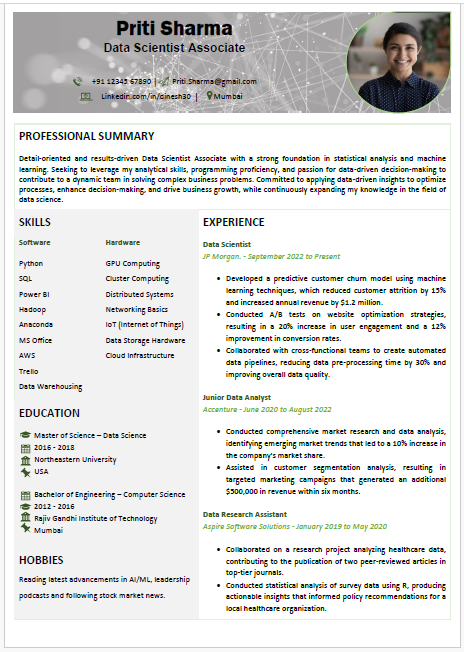Data Scientist
Master of Science – Data Science

About this template
This is a very professional resume which can significantly enhance your job prospects.
This resume is made by MS Word, featuring a clean and modern layout designed to highlight your skills and achievements. Tailored to your industry, it ensures you stand out to recruiters and make a lasting impression.
Some important and useful technical skills for well experienced data scientist
A well-experienced data scientist needs a diverse set of technical skills to analyze complex datasets, build predictive models, and drive data-driven decisions. Here are ten important and useful technical skills for data scientists:
1. Proficiency in Programming Languages:
Expertise in languages like Python and R is essential for data manipulation, statistical analysis, and building machine learning models. Python's libraries (like Pandas, NumPy, and Scikit-learn) and R's packages provide powerful tools for data analysis.
2. Machine Learning and Deep Learning:
Advanced knowledge of machine learning algorithms (such as linear regression, decision trees, and neural networks) and deep learning frameworks (like TensorFlow and PyTorch) is crucial. This skill enables data scientists to develop models that can predict outcomes and recognize patterns in data.
3. Data Wrangling and Cleaning:
The ability to preprocess and clean data is vital for ensuring data quality. Data scientists must handle missing values, outliers, and inconsistencies in data, preparing it for accurate analysis and modeling.
4. Statistical Analysis and Mathematics:
A strong foundation in statistics and mathematics is essential for data scientists. Understanding probability, hypothesis testing, and statistical modeling helps in interpreting data patterns and validating model results.
5. Data Visualization:
Proficiency in data visualization tools like Tableau, Matplotlib, and Seaborn is crucial for presenting complex data insights clearly and effectively. Data visualization helps in communicating findings to stakeholders and making data-driven decisions.
6. Big Data Technologies:
Experience with big data platforms like Hadoop, Spark, and NoSQL databases is important for handling and processing large datasets. These technologies enable data scientists to analyze data at scale and perform real-time data processing.
7. SQL and Database Management:
Strong SQL skills are necessary for querying databases, extracting data, and managing structured data. Knowledge of relational databases and SQL ensures efficient data retrieval and manipulation.
8. Cloud Computing:
Familiarity with cloud platforms like AWS, Azure, or Google Cloud is increasingly important. Data scientists use cloud services for scalable data storage, computational power, and deploying machine learning models in production environments.
9. Natural Language Processing (NLP):
Expertise in NLP techniques is valuable for analyzing and interpreting human language data. Data scientists use NLP for text analysis, sentiment analysis, and building conversational AI models.
10. Data Engineering:
Knowledge of data engineering principles, including ETL (Extract, Transform, Load) processes and data pipeline construction, is essential for managing the flow of data from source to analysis. This skill ensures that data is accessible, reliable, and ready for analysis.